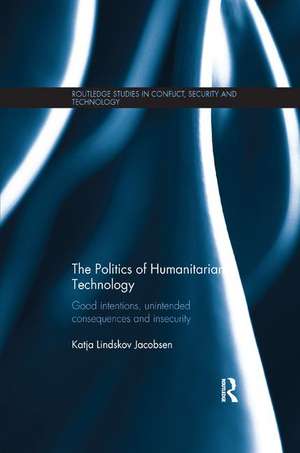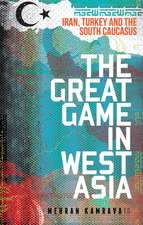The Politics of Humanitarian Technology: Good Intentions, Unintended Consequences and Insecurity: Routledge Studies in Conflict, Security and Technology
Autor Katja Lindskov Jacobsenen Limba Engleză Paperback – 31 ian 2017
We are currently seeing a humanitarian turn to new digital technologies, such as biometrics, remote sensing, and surveillance drones. However, such humanitarian uses of new technology have not always produced beneficial results for those at the receiving end and have sometimes exposed the subjects of assistance to additional risks and insecurities.
Engaging with key insights from the work of Foucault combined with selected concepts from the Science and Technology Studies literature, this book produces an analytical framework that opens up the analysis to details of power and control at the level of materiality that are often ignored in liberal histories of war and modernity. Whereas Foucault details the design of prisons, factories, schools, etc., this book is original in its use of his work, in that it uses these key insights about the details of power embedded in material design, but shifts the attention to the technologies and attending forms of power that have been experimented with in the three humanitarian endeavours presented in the book. In doing so, the book provides new information about aspects of liberal humanitarianism that contemporary critical analyses have largely neglected.
This book will be of interest to students of humanitarian studies, peace and conflict studies, critical security studies, and IR in general.
| Toate formatele și edițiile | Preț | Express |
|---|---|---|
| Paperback (1) | 462.60 lei 43-57 zile | |
| Taylor & Francis – 31 ian 2017 | 462.60 lei 43-57 zile | |
| Hardback (1) | 1053.16 lei 43-57 zile | |
| Taylor & Francis – 17 iun 2015 | 1053.16 lei 43-57 zile |
Din seria Routledge Studies in Conflict, Security and Technology
-
 Preț: 389.66 lei
Preț: 389.66 lei -
 Preț: 311.28 lei
Preț: 311.28 lei -
 Preț: 326.49 lei
Preț: 326.49 lei -
 Preț: 310.85 lei
Preț: 310.85 lei -
 Preț: 310.41 lei
Preț: 310.41 lei -
 Preț: 310.85 lei
Preț: 310.85 lei -
 Preț: 385.55 lei
Preț: 385.55 lei - 15%
 Preț: 309.02 lei
Preț: 309.02 lei -
 Preț: 389.38 lei
Preț: 389.38 lei - 18%
 Preț: 1164.44 lei
Preț: 1164.44 lei -
 Preț: 469.34 lei
Preț: 469.34 lei - 31%
 Preț: 262.89 lei
Preț: 262.89 lei -
 Preț: 383.63 lei
Preț: 383.63 lei -
 Preț: 431.53 lei
Preț: 431.53 lei -
 Preț: 384.09 lei
Preț: 384.09 lei -
 Preț: 386.81 lei
Preț: 386.81 lei -
 Preț: 302.27 lei
Preț: 302.27 lei - 20%
 Preț: 300.32 lei
Preț: 300.32 lei -
 Preț: 311.41 lei
Preț: 311.41 lei - 18%
 Preț: 1003.30 lei
Preț: 1003.30 lei - 18%
 Preț: 1001.39 lei
Preț: 1001.39 lei - 18%
 Preț: 1000.30 lei
Preț: 1000.30 lei - 18%
 Preț: 999.34 lei
Preț: 999.34 lei - 18%
 Preț: 1054.58 lei
Preț: 1054.58 lei
Preț: 462.60 lei
Nou
Puncte Express: 694
Preț estimativ în valută:
88.55€ • 96.21$ • 74.43£
88.55€ • 96.21$ • 74.43£
Carte tipărită la comandă
Livrare economică 21 aprilie-05 mai
Preluare comenzi: 021 569.72.76
Specificații
ISBN-13: 9781138729322
ISBN-10: 1138729329
Pagini: 208
Dimensiuni: 156 x 234 mm
Greutate: 0.29 kg
Ediția:1
Editura: Taylor & Francis
Colecția Routledge
Seria Routledge Studies in Conflict, Security and Technology
Locul publicării:Oxford, United Kingdom
ISBN-10: 1138729329
Pagini: 208
Dimensiuni: 156 x 234 mm
Greutate: 0.29 kg
Ediția:1
Editura: Taylor & Francis
Colecția Routledge
Seria Routledge Studies in Conflict, Security and Technology
Locul publicării:Oxford, United Kingdom
Public țintă
Postgraduate and UndergraduateCuprins
1. Humanitarian Technology 2. Humanitarian Challenges and New Technologies 3. Theorizing Technology 4. Humanitarian Biometrics 5. GM Food Aid and the Molecular Subject as Political 6. Humanitarian Vaccination, Vilization and Expansion of Power 7. Humanitarian Aspirations and Technology Expectations
Notă biografică
Katja Lindskov Jacobsen is Assistant Professor in International Risk & Disaster Management at Metropolitan University College, Denmark.
Recenzii
'The Politics of Humanitarian Technology is a pathbreaking book on the use of new technologies in humanitarian crises. Eschewing the conventional view that technologies are neutral and largely beneficial to populations at risk, Jacobsen brilliantly outlines how humanitarian crises have emerged as laboratories for testing and experimenting new, and often problematic, technologies. Drawing together the work of Michel Foucault and science and technology studies, Jacobsen demonstrates how the ‘humanitarian-technology nexus’ enables complex and unequal enactments of power and privilege. Historically grounded and philosophically sophisticated, this is a brilliant intervention into the politics of humanitarianism' -- Peter Nyers, McMaster University, Canada
'Katja Jacobsen's The Politics of Humanitarian Technology is a timely and profoundly important book. From satellite surveillance through to social media analysis and drone technology, donor governments and humanitarian aid agencies are enthusiastically and uncritically embracing new technology as a one-click solution to their growing problems. With reference to refugee biometrics, GM food aid and rotavirus vaccination development, Jacobsen's meticulously researched and cogently argued book challenges this optimism. Not only is the global-South revealed as an unregulated commercial laboratory for techno-scientific experiments that would be politically difficult in the North, the resulting 'humanitarian' seal of approval is helping legitimate the planetary rollout of new and intrusive forms of global governance and bodily control built upon this experimentation. Amidst all the hype, The Politics of Humanitarian Technology is one of the few critical works to address these developments. It's essential reading for anyone interested or concerned with the role of technology in an increasingly divided world' -- Mark Duffield, Emeritus Professor, University of Bristol, UK
'Jacobsen breathes new life into debates on humanitarian harm through a rich and novel analysis of the introduction of digital technologies to humanitarian practices. Focusing on the troubling political consequences that are suffered by already vulnerable subjects in the process of adopting biometrics and other digital technologies, Jacobsen exposes the extent to which the introduction of humanitarian technology is anything but neutral. This book deserves the full attention of anyone interested in the politics of humanitarianism and digital technologies in global politics' -- Benjamin J. Muller, King's University College at Western University, Canada
'The Politics of Humanitarian Technology sheds light on the centrality of technology to humanitarian practices and asks us to attend to their insidious political effects. Through insightful empirical analyses of humanitarian experimentation and the production of ‘vile’ bodies as objects of experimentation, this book illuminates important changing dynamics of international politics' -- Claudia Aradau, King's College London, UK
'Katja Jacobsen's The Politics of Humanitarian Technology is a timely and profoundly important book. From satellite surveillance through to social media analysis and drone technology, donor governments and humanitarian aid agencies are enthusiastically and uncritically embracing new technology as a one-click solution to their growing problems. With reference to refugee biometrics, GM food aid and rotavirus vaccination development, Jacobsen's meticulously researched and cogently argued book challenges this optimism. Not only is the global-South revealed as an unregulated commercial laboratory for techno-scientific experiments that would be politically difficult in the North, the resulting 'humanitarian' seal of approval is helping legitimate the planetary rollout of new and intrusive forms of global governance and bodily control built upon this experimentation. Amidst all the hype, The Politics of Humanitarian Technology is one of the few critical works to address these developments. It's essential reading for anyone interested or concerned with the role of technology in an increasingly divided world' -- Mark Duffield, Emeritus Professor, University of Bristol, UK
'Jacobsen breathes new life into debates on humanitarian harm through a rich and novel analysis of the introduction of digital technologies to humanitarian practices. Focusing on the troubling political consequences that are suffered by already vulnerable subjects in the process of adopting biometrics and other digital technologies, Jacobsen exposes the extent to which the introduction of humanitarian technology is anything but neutral. This book deserves the full attention of anyone interested in the politics of humanitarianism and digital technologies in global politics' -- Benjamin J. Muller, King's University College at Western University, Canada
'The Politics of Humanitarian Technology sheds light on the centrality of technology to humanitarian practices and asks us to attend to their insidious political effects. Through insightful empirical analyses of humanitarian experimentation and the production of ‘vile’ bodies as objects of experimentation, this book illuminates important changing dynamics of international politics' -- Claudia Aradau, King's College London, UK
Descriere
This book offers a detailed exploration of three examples of humanitarian uses of new technology, employing key theoretical insights from Foucault.


















